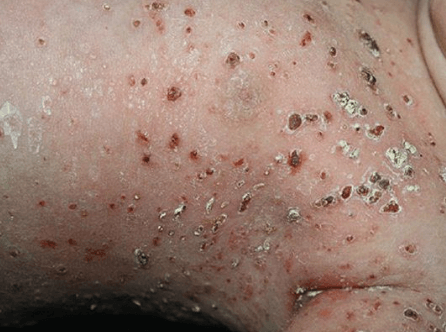Quick Overview
Langerhans Cell Histiocytosis (LCH) is a rare disorder that primarily affects children, but can also occur in adults. It’s characterized by the overproduction and accumulation of Langerhans cells in various tissues and organs. Langerhans cells are normally found in the skin, lungs, and lymph nodes, but in LCH they can collect in other organs also, such as the bones, liver, and spleen.

Table of Contents
Langerhans Cell Histiocytosis Causes
The exact cause of Langerhans Cell Histiocytosis is not yet fully understood. However, it’s believed to result from an abnormal immune response, where the Langerhans cells, a type of immune cell, become overactive and accumulate in various tissues and organs. There may be genetic predispositions, but it’s not typically inherited. Environmental factors or genetic mutations might contribute to the development of the condition.
Signs and Symptoms
The signs and symptoms of Langerhans Cell Histiocytosis, can vary widely among individuals. Some of the common indications include;
- Bone Lesions: Painful or swollen bones are often an initial sign of LCH, especially in children. This can result in limping or other mobility issues.
- Skin Rash: Skin lesions resembling seborrheic dermatitis or eczema are common. These rashes can be painful or itchy.
- Respiratory Symptoms: LCH may affect the lungs, leading to cough, shortness of breath, and other respiratory problems.
- Fever: Persistent, unexplained fevers can occur.
- Lymph Node Enlargement: Swelling of lymph nodes may be noticeable.
- Hepatosplenomegaly: Enlargement of the liver and spleen can lead to abdominal discomfort.
- Diabetes Insipidus: This condition may develop due to LCH involvement in the pituitary gland.
- Neurological Symptoms: In some cases, LCH may affect the central nervous system, leading to headaches, seizures, or behavioral changes.
Read also Moyamoya Disease: Cause, Signs, Symptoms, Treatment
Diagnosis
Diagnosing of LCH often involves a combination of clinical evaluation, medical imaging, and biopsy. Imaging techniques such as X-rays, CT scans, and MRI can reveal bone lesions and organ involvement. Biopsy, where a small sample of affected tissue is examined under a microscope, is crucial for confirming the presence of Langerhans cells and establishing a diagnosis.
Complications
Langerhans Cell Histiocytosis can lead to various complications, which include;
- Permanent Damage: If not promptly treated, LCH can lead to permanent damage to bones and organs.
- Growth and Development Issues: Children with LCH may experience growth and developmental delays.
- Diabetes Insipidus: This condition may require lifelong management.
- Recurrence: LCH can return, even after successful treatment, necessitating ongoing monitoring.
- Secondary Cancers: Some individuals with LCH may have a slightly increased risk of developing certain cancers later in life.
Also read Lymphangioleiomyomatosis: Causes, Symtoms, Treatment
Treatment
The treatment of Langerhans Cell Histiocytosis depends on the extent and severity of the disease. Treatment options may include;
- Watchful Waiting: Some cases of LCH may resolve on their own, especially if they are limited to a single organ.
- Corticosteroids: These medications are often used to reduce inflammation and control symptoms.
- Chemotherapy: In more severe cases, chemotherapy may be necessary to suppress the overactive Langerhans cells.
- Targeted Therapies: Emerging treatments, such as BRAF inhibitors, are showing promise in some cases of LCH.
- Surgery: Surgical intervention may be required to repair or stabilize damaged bones or organs.
Questions
1. Q: Is Langerhans Cell Histiocytosis a cancer?
Langerhans Cell Histiocytosis is not considered a true cancer, but rather a disorder of the immune system. It involves the proliferation of Langerhans cells and can mimic some aspects of cancer due to tissue infiltration, but it does not originate from cancerous cells. Treatment approaches often resemble those used for cancer, however.
2.Q: Can Langerhans Cell Histiocytosis be inherited or passed down in families?
LCH is typically not an inherited condition. It is considered sporadic, and there is usually no family history of the disease. However, genetic factors may play a role in the development of LCH, although the exact cause is still under investigation.
3. Q: Is Langerhans Cell Histiocytosis contagious or infectious?
No, LCH is neither contagious nor infectious. It is not caused by exposure to pathogens or infectious agents. Instead, it is associated with the abnormal behavior of certain immune cells within the affected individual.
4.Q: Can adults develop Langerhans Cell Histiocytosis, or is it mainly a childhood condition?
LCH can affect both children and adults, but it is more commonly diagnosed in childhood. It can present at any age, and the clinical course and treatment may differ between pediatric and adult cases. Therefore, it’s crucial for people of all ages to be aware of the condition.
5.Q: Are there long-term effects or potential complications of Langerhans Cell Histiocytosis?
Yes, there can be long-term effects and complications of LCH, depending on the extent and severity of the disease. Complications can include permanent damage to bones and organs, growth and developmental issues in children, diabetes insipidus, and an increased risk of secondary cancers in some cases. Timely diagnosis and appropriate treatment can help reduce the risk of complications and improve outcomes.
